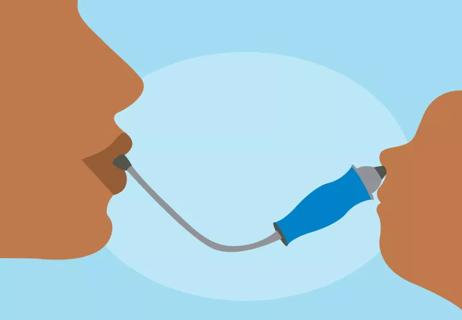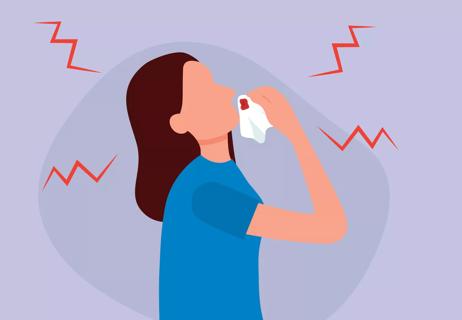Correct positioning is one of the keys to getting the best results

Another sneeze, another sniffle. You can’t wait to get ahold of a nasal spray so you can find relief for your stuffy nose ASAP.
Advertisement
Cleveland Clinic is a non-profit academic medical center. Advertising on our site helps support our mission. We do not endorse non-Cleveland Clinic products or services. Policy
“While nasal congestion can be treated with an over-the-counter nasal spray, using the spray isn’t always as simple as seems,” says allergist Mark Aronica, MD. “Correct positioning and technique are the keys to getting the best results.”
The simple explanation of nasal sprays is that they target inflammation in your nasal passages, which reduces swelling and helps clear up stuffiness.
Some nasal sprays (steroid nasal sprays and antihistamine sprays) are specifically designed to treat allergy symptoms and can be used for the long term.
A third type, called decongestant nasal sprays, should only be used for a few days at a time, so they’re best for treating congestion caused by a cold or the flu.
Nasal sprays are medication — and like any medication, if you take them wrong, you won’t get their full benefits. With nasal sprays, it all comes down to proper usage.
“Technique is very important with nose sprays,” Dr. Aronica says. “Sometimes, patients tell me their spray isn’t working, but when we improve their technique, it really helps.”
Here’s the right way to use your nasal spray:
Advertisement
Dr. Aronica also weighs in on a few common usage errors — things you shouldn’t do when you’re using a nasal spray.
“You never want to direct the spray at the nasal septum, which is the middle portion of your nose,” he says. When you push a spray directly onto your septum, the force can damage the tissue, and you can end up with irritation or a bloody nose.
Most products can be applied while you’re in an upright position, so you don’t have to tilt your head back. “You don’t want it dripping down the back of your throat,” Dr. Aronica notes.
If you suck the medicine to the back of your throat and swallow it, it doesn’t have the opportunity to do what you need it to do — get into your sinus cavity. A gentle sniff should do the trick.
It’s tempting to grab a tissue after you’ve used a nasal spray, but try to avoid it. “You want as much of the medicine to stay in the nose and sinus as possible,” Dr. Aronica advises.
To avoid spreading bacteria, keep your spray to yourself. You don’t want anyone else sticking something up their nose that’s just been in yours!
“Keep the bottle clean and only allow one person to use it,” he says. “Remember to wipe down the nasal spray bottle and put the cap back on after each use.”
Have you ever heard that if you use a nasal spray too much, you’ll stop feeling relief from them? This is called the rebound effect, but it’s only possible with one type of nasal spray — and it’s one you shouldn’t be using for more than a few days in a row, anyway.
Because there are a few different kinds of nasal sprays, it’s important to know exactly what you’re using, how often to use it and whether it’s habit-forming. Only decongestant nasal sprays can result in the rebound effort. Here’s what to know about each type:
Advertisement
If you experience the rebound effect from using a decongestant nasal spray, it may be accompanied by minor side effects like a bitter smell or taste, sneezing, runny nose and nasal irritation, including burning and stinging. If you experience major side effects like a change in heart rate, tremors, unusual sweating or persistent nosebleeds, consult a doctor.
While most people can safely use nasal sprays, your doctor or pharmacist may have other recommendations if you have diabetes, high blood pressure or hyperthyroidism, or if you’re taking other medications.
You also shouldn’t use a nasal spray if your nasal passages are damaged. This condition, known as rhinitis medicamentosa, happens when you use a decongestant nasal spray for longer than a few days. “When this happens, you might need more medicine to control your congestion, or your congestion might worsen if you stop using the spray,” Dr. Aronica cautions.
As always, the best thing to do is to consult your doctor to make sure that nasal spray is safe for you. With their help, you’ll be well on your way to safely getting your allergies under control.
To learn more about allergies from Dr. Aronica, listen to the Health Essentials Podcast episode, “Dealing with Spring and Summer Allergies.” New episodes of the Health Essentials Podcast publish every Wednesday.
Advertisement
Learn more about our editorial process.
Advertisement

Staying calm, sitting up straight and gently pinching the sides of your nostrils can help a bloody nose go away faster

Dry air, allergies or nose-picking may be to blame for nighttime epistaxis

Take care of your runny or stuffy nose by staying hydrated, using a humidifier and considering a medication

Allergies, acid reflux and even pregnancy can increase drainage and upset your stomach

Yes, it’s safe for babies starting at about 9 months old and can help clear nasal mucus

Keeping your baby’s airways clear of mucus helps with breathing and feeding

Seek help if bleeding doesn’t stop or they’re interfering with your life

It’s usually the way your nose manages airflow, but sometimes, it could be other issues

If you’re feeling short of breath, sleep can be tough — propping yourself up or sleeping on your side may help

If you fear the unknown or find yourself needing reassurance often, you may identify with this attachment style

If you’re looking to boost your gut health, it’s better to get fiber from whole foods